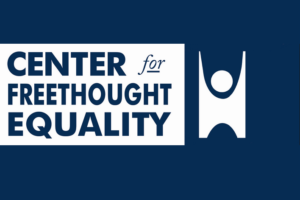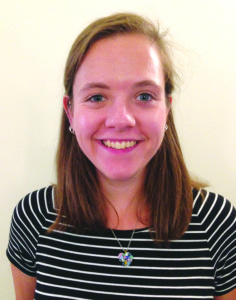Meet the New Intern: Abigail Ulman

Please welcome the Center for Freethought Equality’s new summer intern, Abigail Ulman!
TheHumanist.com: What is your educational and work background?
I am currently a rising senior at Georgetown University, studying science, technology, and international affairs with a concentration in energy and environment and a minor in Chinese. I spent the fall 2017 semester studying intensive Chinese abroad in Hangzhou, China.
I have interned at a number of nonprofit organizations, mostly focusing on women’s rights and empowerment, environmental advocacy and development, and progressive politics, as well as with my senator, Richard Blumenthal.
TheHumanist.com: How did you first learn about humanism?
 For as long as I can remember, humanism has been a part of my life. My family joined the congregation of the Society for Humanistic Judaism in my town when I was five years old, and we’ve been members since. I identify as a Humanistic Jew, have always been an atheist, and was raised according to a people-centered philosophy that centered humanist values.
For as long as I can remember, humanism has been a part of my life. My family joined the congregation of the Society for Humanistic Judaism in my town when I was five years old, and we’ve been members since. I identify as a Humanistic Jew, have always been an atheist, and was raised according to a people-centered philosophy that centered humanist values.
TheHumanist.com: Did you grow up in a traditional religious faith? How did it impact you?
I grew up in a decidedly non-traditional religious faith. My family and I are secular Humanistic Jews, which means we identify as Jewish, practice Jewish values, and celebrate Jewish culture and tradition, but all without a divine being or god. Our communal practices do not mention a supreme being, and we center our spiritual practices on the importance and responsibility of people to change the world. This responsibility, ingrained in me since childhood, greatly influenced my ultra-progressive beliefs and made me want to go into a career in social justice and activist work. My humanist upbringing has only strengthened my values as I attend a Jesuit university.
TheHumanist.com: What interested you most about working for the Center for Freethought Equality (a sister organization of the AHA dedicated to lobbying and political advocacy)?
The separation of church and state and protecting civil rights for all Americans applies to all the issues I am passionate about, including women’s health and rights, the importance of science and evidence-based research and policy, and LGBTQ+ rights. I’ve always been active in my humanist community, but I wanted to learn more about how to advocate for progressive policies with a specifically humanist angle and elect candidates who will push for secular, humanist legislation, especially in the current administration. Now more than ever, I believe secular advocacy is needed to push back against the growing influence of religion in politics, and I wanted to be part of that fight.
TheHumanist.com: What book has influenced you the most?
Outliers by Malcolm Gladwell. I’ve never conformed to the pull-yourself-up-by-your-bootstraps philosophy, and this book showed me even more how everyone’s life is ultimately due to chance and circumstances, and made me think more critically about my own position in the world.
TheHumanist.com: If you could have dinner with any three people in the world (living or dead), who would they be and why?
Ms. Clara Spence (my great-great-grandmother and founder of The Spence School and Spence-Chapin Adoption Agency in New York), Gloria Steinem, and Michelle Obama. All have been incredible, strong feminists who have inspired me and my work. I would ask what drove them to their work, and how I can make the most positive, long-lasting impact on the world.
